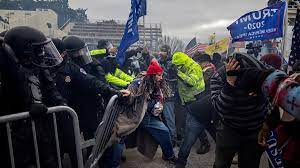Atari, M., Davani, et al. (2021).
Social Psychological and Personality Science.
https://doi.org/10.1177/19485506211059329
Abstract
Online radicalization is among the most vexing challenges the world faces today. Here, we demonstrate that homogeneity in moral concerns results in increased levels of radical intentions. In Study 1, we find that in Gab—a right-wing extremist network—the degree of moral convergence within a cluster predicts the number of hate-speech messages members post. In Study 2, we replicate this observation in another extremist network, Incels. In Studies 3 to 5 (N = 1,431), we demonstrate that experimentally leading people to believe that others in their hypothetical or real group share their moral views increases their radical intentions as well as willingness to fight and die for the group. Our findings highlight the role of moral convergence in radicalization, emphasizing the need for diversity of moral worldviews within social networks.
General Discussion
Two days before his account would be permanently suspended “due to the risk of further incitement of violence,” President Trump tweeted “These are the things and events that happen when a sacred landslide election victory is so unceremoniously & viciously stripped away from great patriots who have been badly & unfairly treated for so long [emphases added].” Brady, Crockett, and Van Bavel (2020) have recently demonstrated the efficacy of the circulation of such moralized rhetoric in online echo chambers. We argue, in this work, that this type of rhetoric is further validated and reinforced in the congenial atmosphere of social networks, creating a perception of moral homogeneity, and a moral obligation to defend the ingroup even by radical means, as it transpired in the U.S. Capitol on January 6, 2021.
In Study 1, we found that users who converged with their cluster’s moral profile were more likely to disseminate hate speech; language intended to dehumanize, or call for violence, against outgroup members. In Study 2, we successfully replicated this effect in Incels, a social network in which members disseminated misogynistic rhetoric. These observational studies point to the possibility that homogeneity in moral worldviews within social networks could potentially result in validation and reinforcement of the common attitudes, and consequently, in radicalized behaviors. No direction of causality, though,could be inferred from these observational social-network studies (DellaPosta, Shi, & Macy,2015; Shalizi & Thomas, 2011).
